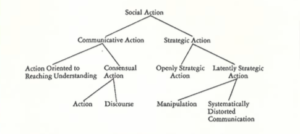
There have been a lot of things posted explaining “Trump voters” that assume one cause. They’re stupid; they’re racist; they’re authoritarians; they’re opposing identity politics; they’re rejecting neoliberalism. That’s absurd. It’s classic ingroup/outgroup thinking, in which the outgroup (“Trump voters”) are all the same. I can’t imagine those same pundits and columnists writing articles in which they similarly homogenize “Clinton voters”—they’d recognize the error in regard to their own group.
Having wandered around pro-Trump sites before the election, it seems to me that Trump voters were, on the whole, just as diverse as Clinton voters. Given his approval ratings even at the time of the election, it’s clear that a fairly large number of people who voted for him didn’t support him. I don’t think we should be wondering about Trump voters as much as Trump supporters, and I’d suggest we not try to treat them as though they’re all the same. It looked to me as though it would be more useful to think in terms of four mobilizing passions that helped Trump: opposition to abortion, opposition to Clinton, authoritarianism, relying on charismatic leadership.
Those aren’t discrete categories—a person might have one or all or some combination of those attachments, and different people might have any of them to different degrees.
Shared among all Trump supporters (but not unique to them), it seemed to me, were two characteristics. First, they were wickedly (and deliberately) misinformed, and so narrowly overinformed that it amounted to misinformed. I don’t think the question of whether they were stupid or uninformed (which is how much criticism of them is oriented) is sensible—it’s rarely grounded in any kind of consistent definition of “stupid” or “ignorant.” I would say, on the contrary, that many of them made decisions that appeared rational within the context of the information they had. (And Trump supporters aren’t the only group making decisions that appear rational within a certain set of information.)
Second, consistent among most Trump supporters (and, btw, many supporters of candidates other than Trump) is the premise that you should vote for someone who is like you, and who will sincerely promote policies to support people like you. That’s ingroup/outgroup thinking.
Some people first and only think in terms of ingroup/outgroup. They walk through their worlds flinging every person into two thoroughly opposite categories—Us and Them. There are people whom we can trust, and two kinds of Them—those who are explicitly and eternally out to exterminate us, and those whom they have fooled, or are trying to fool.
Because we believe that we have good motives, and are basically good people, anyone who persuades us that s/he and we are the same has just gotten us to engage in all the ego-protection systems we use for ourselves. As long as we perceive them as in our ingroup, we will attribute good motives to them, even if they do something we normally condemn.
Thus, if a member of an ingroup and a member of an outgroup do exactly the same thing, most of us will explain them differently. An ingroup member who works hard has a good work ethic, and outgroup member is greedy. An ingroup member who promotes zir own family is loyal, an outgroup member is clannish. An ingroup member who uses zir position in government for personal profit is smart; an outgroup member is corrupt.
Ingroup/outgroup thinking isn’t limited to any political agenda, and the most fanatical members of any group, political or not, are highly prone to it (they may, in fact, approach every decision in ingroup/outgroup terms), but research by Jonathan Haidt strongly suggests that people who self-identify as conservative do value loyalty to group, on the whole, more than do people who self-identify as liberal. Thus, while everyone probably engages in ingroup/outgroup thinking sometimes, not everyone does to the same degree, and “both sides” aren’t “just as bad.”
Connected to reliance on ingroup/outgroup thinking is what might be called “social knowing”—that is, relying heavily on group membership for one’s beliefs. It’s been clearly demonstrated that people will engage in considerable cognitive work in order to reconcile their beliefs with what they believe they should believe. (Yes, it’s that circular.) If, for instance, I’m a Chesterian, and I mistrust little dogs—in fact, I think that mistrusting little dogs is one of the essential traits of Chesterians–and I see Chester being nice to a little dog, I have considerable cognitive dissonance about Chester. I might decide that he wasn’t really being nice, it wasn’t really Chester, he was pretending, or that little dog isn’t really little. The more prone I am to ingroup/outgroup thinking, the more I will protect my ingroup from criticism—even my own criticism—and that protection can take some cognitive heavy lifting.
In addition to becoming a foundation I protect, my loyalty to my ingroup may become the basis for any assessment I make of possibly new beliefs. People who rely heavily on ingroup/outgroup thinking assess the “credibility” of a source on the basis of group membership—disconfirming information coming from an outgroup is, a priori, unreliable. Further, any information that disconfirms important ingroup claims or that is critical of the ingroup can be dismissed on the grounds that it is from an outgroup source. That’s pretty abstract, so let me try to make it more clear.
Assume that someone believes that Clinton’s email practices caused people to die at Benghazi–I ran across people who believed that, and they believed that the Benghazi Report proved it. It didn’t–it didn’t even make that claim. What I discovered is that, although they couldn’t give me any links or citations from the report that supported their interpretation, and although I could give sources that would show how wrong that claim was, they refused to look at those sources because they must be biased.
In other words, they believed their beliefs were “objective” and, therefore, any source I gave that contradicted their “objective” believe must be biased and false. It didn’t matter if I gave in-group sources, such as conservative journals or the Benghazi Report itself. That’s called a “hermetically sealed belief system”–the beliefs reinforces each other, and are completely untouchable by outside information. “Clinton’s email practices caused people to die, and I know that true because sources I trust say so, and I don’t trust any sources that say otherwise.”
This hermetically sealed belief system is crucial for understanding why enclaves are so problematic as the basis for public deliberation. And, as I mentioned above, one thing that strikes me about Trump supporters (not just people who voted for him, but who support him) is that they are not ignorant—they are highly and deliberately misinformed, and so narrowly overinformed with context- and comparison-free information that it amounts to misinformation.
One final point about the importance of ingroup/outgroup thinking and public deliberation. For people prone to ingroup/outgroup thinking, every interaction is a competition among the groups, and every discussion is really about which group is better. Thus, if you say that Hubert’s plan regarding squirrels costs less than Chester’s, and is probably more effective, if I’m invested in ingroup/outgroup thinking, then my reaction is not, “Huh, I wonder if that’s true—I should look into that, because it would be great for our community to have an effective and inexpensive method of keeping squirrels from the red ball!” Instead, my reaction would be that you just scored a point for Hubert, and I need to score a point against you. I might do that by pointing out that Chester’s plan for keeping possums away is better than Hubert’s, or become more invested in proving you wrong than in finding the best solution for our community, or even work to make sure Hubert’s policy fails just because that would be a loss for the prestige of my group.
Being in an ideological/informational enclave is, unhappily, not unique to any group, nor is relying on social groups as bases and standards of knowledge. And the four passions are also shared with other groups—this is an argument about tendencies and frequencies, not about identities. Not all Trump Supporters, and Not Only Trump Supporters. One other point I’ll make before talking about the four passions.
To call them passions isn’t to say that Trump supporters are inherently irrational or impaired in their ability to participate in public discourse. I don’t think passions are inherently irrational, let alone bad. We participate in public discourse because we have passions. Particular passions will tend to lead us in various directions, and so it’s useful to think about which ones and what directions they tend to take us.
1) Opposition to abortion
It seemed to me that large number of people advocating for Trump did so on the grounds that he would appoint Supreme Court justices who would overrule Roe v. Wade, and thereby enable a national ban on abortions and abortificants.
Abortion is being used as a classic wedge issue, and it’s working, especially with groups one would have expected to vote against Trump (such as Latina/os). The notion that we should and could end abortion by banning it is rationally indefensible, especially if the ban is connected to reducing access to and accurate information about effective birth control—the research is pretty clear that a more effective way to reduce abortion is to do what has worked in other countries and increase access to and accurate information about birth control. Abortion must remain a viable option for situations that are, one hopes, unusual—thus, Clinton’s stance that abortion should be legal, safe, and rare.
But what I found about Trump supporters is that they believe that abstinence only is an effective form of birth control—they haven’t seen the studies that show its actual consequences, and/or they argue that it must work because not having sex necessarily results in not getting pregnant. That is, they argue deductively from premises, rather than inductively about the feasibility (in fact, it seemed to me that Trump supporters rarely considered the feasibility of policies, partially because they really didn’t like arguing policies). Similarly, they don’t believe that abortions are ever medically or psychologically necessary, because that’s the information they’re getting.
And they believe a lot of things about abortion and Planned Parenthood especially. Trump supporters on the abortion issue repeatedly asserted as a fact that Planned Parenthood was making money by selling fetus body parts and was actively promoting abortion (so that they could get more body parts to sell), and they seemed to have a perception of it as a for-profit business. Not only is the whole narrative false, it’s even internally absurd: if they are promoting abortions because that’s how they. make money, they wouldn’t bother giving out birth control.
For many Trump supporters, their views on abortion are reinforced by their perception that their particular kind of opposition to abortion is in a binary relationship to being “for” abortion. In other words, if you don’t believe what they do about abortion, then you’re promoting abortion. They don’t understand the “abortion should be safe, legal, and rare” stance because they’ve often never heard it—they sincerely believe that people who want abortions to be legal as a choice want all women to get abortions all the time. (That’s why some people accuse women who support the right to an abortion and who have had babies of being “hypocrites.”)
They don’t know the statistics about abortion rates in other countries, and sincerely believe that telling people (women, really) that birth control is a viable option guarantees that young women will end up getting abortions, STIs, breast cancer, and lead tragic, self-hating lives.
I think they’re wrong, and I think there is good data showing them they’re wrong, but they’ve never seen it. They live in worlds where the breast cancer/abortion correlation—although completely disproven—is a “fact,” and it is only a “fact” because it is repeated so often, and because the people who repeat it are ingroup members; the people who dispute it are (by definition) outgroup members.
What struck me about many of the people making these arguments is that they are perfectly sincere, and that their stances on abortion make sense given the informational world they inhabit. Since they also believe that good people are giving them this information, and they shouldn’t trust anyone who gives them other information, I think it’s hard to imagine what would change that world.
2) Opposition to Clinton
There’s a similar problem of inhabiting a world of misinformation in regard to Clinton. People who insisted that Trump was better than Clinton because she is so evil had a long list of horrifying things Clinton was supposed to have done, and it struck me that the most compelling of them tended to fall into two categories.
Some of it was simply misinformation, and had been debunked multiple times. Clinton hadn’t laughed about a girl getting raped, she didn’t have a warehouse full of ballots in Ohio, she wasn’t directly responsible for what happened in Benghazi, she didn’t approve a uranium deal, she never murdered anyone, and so on. One of my favorites (because so absurd) was probably the most common–that she’s a socialist, who wants to nationalize all industries. (This was one of two on which I made any headway with Trump supporters–I pointed out that she was a third-way neoliberal. It didn’t help in the long run, I think, because they saw the word “liberal” and thought that meant soft socialist–they didn’t know what neoliberal meant.) But these people had never heard the debunkings—they’d just heard the claims, over and over.
The other category was a set of claims that were technically true, but without context or comparison. So, they knew all the problems with the Clinton Foundation, but appeared completely unfamiliar with any of the criticisms of the Trump Foundation; they could list Clinton’s “lies,” but not Trump’s (I really think they’d never read or heard anything that pointed out his problem with accuracy); they called Clinton a Wall Street stooge because of her ties to Goldman Sachs, but were apparently unaware of Trump’s problematic financial dealings. To condemn Clinton for being too friendly to business is a legitimate criticism, but to condemn her for that and advocate voting for Trump instead means not understanding how her stances compare to his–it’s the same thing with their charitable foundations, dishonesty, corruption, and so on.
They were sincere, and, within that world, it made sense to be deeply opposed to Clinton because they didn’t have the information to make any comparison—that they might be wrong, that they might have been lied to, that they might not have been given all the information about Trump, was not part of that world.
3) Faith in charismatic leadership
Weber identified three sources of power for leaders: legal, traditional, and charismatic. His insights about charismatic leadership, and the later research on that, were tremendously important for explaining the volatile power of some leaders. Unhappily, beginning in the 1970s people in management and business coopted the term and significantly changed the concept, so that, for them, “charismatic leadership” is a good thing, and all leaders should have it.
In sociology, however, it means a leader to whom people give power because they believe him (or her) to be extraordinary, divinely chosen, heroic, almost supernatural in his/her ability to succeed regardless of the obstacles. The charismatic leader violates rationality—one follows him/her not because of the policies s/he proposes, but because one believes s/he has the kind of nearly magical perfect judgment that will inevitably succeed. Charismatic leadership is a relationship between the person who is supposed to have those qualities and the followers who attribute those characteristics to the leader.
People drawn into that relationship tend to believe that there are certain characteristics that signify a charismatic leader (boundless energy and excellent health are two that come up often, even if those aren’t qualities that necessarily correlate to good judgment). They also generally believe that we don’t need policy arguments—either the correct course of action is clear to everyone (and politicians aren’t following it just because they’re jerks, they benefit from the dithering, or they’re outgroup members), or, not matter how complicated it looks, their Charismatic Leader can see what to do. They want a leader who will cut the Gordian knot of policy.
In this world, there is no real value to area-specific content expertise—a person who has been successful as a celebrity, for instance, can succeed as a politician or diplomat if s/he has the kind of judgment attributed to a charismatic leader. There is also no such thing as legitimate difference of opinion, or complicated situations, or a reason to argue policy.
Many of Trump’s supporters described him in these sorts of terms, and, as with the other passions, this sense of him was reinforced by the list of accomplishments they believed he had—they hadn’t heard the debunking of many of those claims, they hadn’t noticed that even he was inconsistent in his claims about himself, they hadn’t heard criticism. They liked that he hadn’t stated his policies.
4) Authoritarianism
Erich Fromm argued that Nazism had two important characteristics. First, it offered people an escape from freedom. Genuine freedom, for Fromm, doesn’t mean there are no restraints on you, but that you take full responsibility for whatever choices you have made within your constraints. That’s a huge responsibility, and many people want to edge out of it. So, many people are happy to turn over the responsibility for their choices to someone else. They were just following orders (although they chose to join the organization that gave those orders, or voted for the people who gave those orders, or keep choosing not to leave the institution that requires they follow those orders). Second, it offered what later scholars would call “proxy by agency” which is that you can feel powerful even if you didn’t do the thing. Paradoxically, you feel powerful by giving up your agency.
Fromm described it as a kind of kiss-up/kick-down dynamic. You could be sadistic toward people below you on the hierarchy as long as you were masochistic toward those above you.
I think all of what Fromm said is useful, especially if put it in the context of the research mentioned above about social groups. Here’s the short version: we experience our “self” as constituted by membership in a group, and that group is defined partially (largely?) by what it is not. You are a dog person, and that is only a meaningful sense of identity if there is another possibility—being a squirrel person, or a bunny person, or an anti-dog person. But that description isn’t quite right, because there might be a continuum among people who are for us, through people who don’t care, to those who want to exterminate us. Authoritarianism rejects the continuum, and presumes that ingroups and outgroups are Real and mutually exclusive—you are with us or against us. If social groups are Real, then you are always a member of a group, and if you submit thoroughly to that group, you are guaranteed a kind of protection. And you get to kick the outgroup.
Authoritarianism relies on binaries (this is not a world with grey), and on naïve realism—the assumption that the correct course of action is always obvious to anyone reasonably intelligent. There are two ways of being against us—you might be explicitly and essentially out to kill us, or you might be a dupe of that group.
That authoritarians don’t do grey means they have trouble understanding nuanced arguments, or arguments about tendencies—it’s striking to me how often they read an “often” as an “always” or perceive opposition arguments as making universal claims—a claim that “many members of x group do y” will often be restated as “You’re saying all that all members of x group do y” and then refuted with a single counter-example. I don’t think this is deliberate straw man; I think it’s really what they are hearing in that moment.
George Lakoff uses the term “Strict Father Morality” for what is extremely similar to other scholars’ discussions of authoritarianism. People who believe in the Strict Father Model believe in punishment as the solution to most (for some it’s all) social problems, and tend to see relationships in submission/domination dichotomies. This means that they are particularly prone to handle disagreement in the way described above—a disagreement is not an opportunity to correct one’s course of action, or to find a better course of action, or even to learn. For many people, a disagreement in which you find out you were wrong is a good thing—you’ve won because you are now able to do something better. For an authoritarian, a disagreement is a challenge you lose by admitting error, changing your mind, or being persuaded. You are right because you are saying what the ingroup knows to be right, and that’s all you need to know. This seems to me a tragic world in which to live–one in which you can never admit error, and therefore can never learn from your own mistakes.
The point I’m making about these four passions is that they are enhanced by living in a world of confirmation. And, as I said, it struck me that the most committed Trump supporters with whom I argued were very likely to live in such a world—they hadn’t invented, or misunderstood, the things they believed. They had been told these things, over and over, by sources they trusted (and which told them not to trust anyone who told them anything else). I’m not saying they were gullible—they were just singly informed. And they refused to look at information that even might be disconfirming, on the grounds that it was a from a biased source–which they concluded on the basis that it was disconfirming.
There’s one other point I want to make about these observations. I think they’re empirically falsifiable. I think it would be possible to test them by finding people who supported Trump, opposed him, and the range in between, ask them how much they supported/opposed him, and then tried to place them in a continuum of commitment on each of these passions. If my impressions are right, then people most committed to most of these passions would be most vehement in their support of Trump. Being less committed to the passions would correlate to being less supportive of Trump.
And, if I’m right, then we’re wrong to focus so much on Trump. We need to focus on the problems of enclaves of information.










